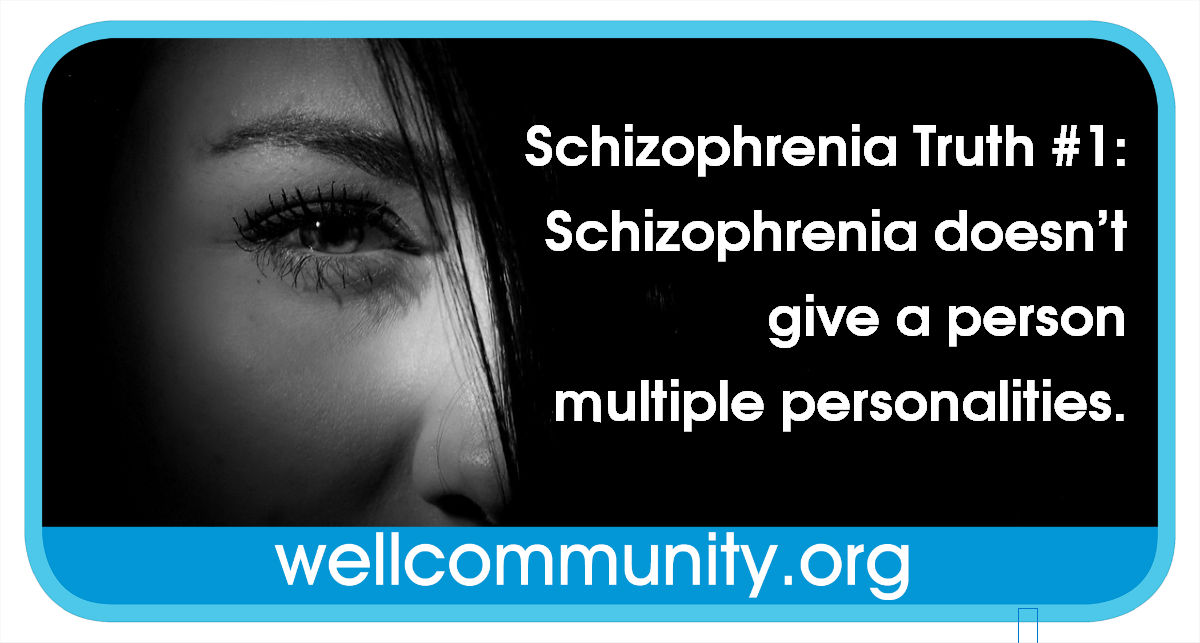 Schizophrenia is one of the most debilitating mental illnesses. It’s also among the most misunderstood. This serious, chronic disease can cause hallucinations, delusions and difficulty concentrating, as well as social withdrawal and emotional unresponsiveness. And, due to misunderstandings about this condition, those who are already struggling often deal with social prejudice as well.
Schizophrenia is one of the most debilitating mental illnesses. It’s also among the most misunderstood. This serious, chronic disease can cause hallucinations, delusions and difficulty concentrating, as well as social withdrawal and emotional unresponsiveness. And, due to misunderstandings about this condition, those who are already struggling often deal with social prejudice as well.
Many myths surround schizophrenia. Learning the truth is the first step in fighting the stigma that results from these misconceptions. Here’s the real story behind seven myths about schizophrenia.
Myth #1: People dealing with schizophrenia have multiple personalities.
One of the most common misconceptions about schizophrenia is the idea that those struggling with it have numerous personalities. Dissociative identity disorder (formerly known as multiple personality disorder) can cause a person to alternate between several identities, but schizophrenia does not. While the word “schizophrenia” comes from two Greek words meaning “split mind,” it refers to a split from reality experienced by those affected by this mental illness, not a split personality.
Myth #2: Schizophrenia is caused by poor parenting or personal weakness.
A number of factors can contribute to the development of schizophrenia. Genetics, environmental factors, brain chemistry and substance use can each play a role. But, there’s no evidence that poor parenting or personal weakness brings on schizophrenia. It’s a biological disorder of the brain, not an emotional disturbance.
Myth #3: Everyone who struggles with schizophrenia is dangerous.
People living with schizophrenia are more likely to be victims of violence than they are to commit violent acts. Those affected by this disease tend to be withdrawn—not aggressive. But unmerited fears that they’re dangerous can prompt others to deny them opportunities for jobs and housing. Ongoing treatment can further reduce the small likelihood of violence to themselves or others.
Myth #4: Schizophrenia always causes the same symptoms.
No two people dealing with schizophrenia experience it in exactly the same way. While there are several types of schizophrenia, each characterized by particular symptoms, even those diagnosed with the same type will have difference experiences. The nature, frequency and severity of symptoms is unique to each person.
Myth #5: Schizophrenia is very rare.
Through schizophrenia isn’t as common as some other serious mental illnesses, it still impacts a significant number of Americans. It’s estimated that between 0.25% bad 0.64% of U.S. adults live with this illness, making it approximately as prevalent as conditions like multiple sclerosis and Crohn’s disease and more common than muscular dystrophy.
Myth #6: People struggling with schizophrenia aren’t intelligent.
Schizophrenia can affect people with any IQ. Many highly intelligent people have been diagnosed with this disease. For example, Nobel Prize winner John Nash, who’s been called a mathematical genius and was the subject of the Oscar-winning movie “A Beautiful Mind,” lived with schizophrenia for decades.
Myth #7: Schizophrenia can’t be treated.
Although schizophrenia can’t be cured, it can be treated! Early identification and treatment are important as symptoms tend to become increasingly disruptive when they aren’t addressed. A treatment plan often includes medication, psychosocial rehabilitation and psychotherapy, as well as support from loved ones.
The Well Community gives individuals dealing with schizophrenia and other serious mental illnesses a place to belong. Your gift to The Well provides them with community and support services that can help them take steps toward recovery.
Give now.
Read more about specific mental illnesses on our The Facts webpage.
